Dignitatis humanae is the Second Vatican Council's Declaration on Religious Freedom. In the context of the council's stated intention "to develop the doctrine of recent popes on the inviolable rights of the human person and the constitutional order of society", Dignitatis humanae spells out the church's support for the protection of religious liberty. It set the ground rules by which the church would relate to secular states.
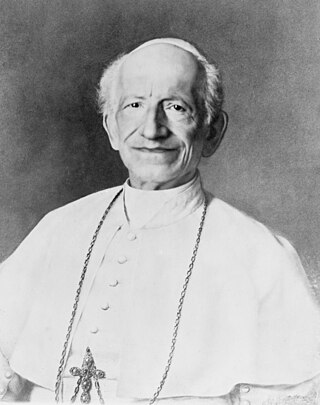
Pope Leo XIII was head of the Catholic Church from 20 February 1878 until his death in July 1903. Living until the age of 93, he was the oldest pope whose age can be validated, and had the fourth-longest reign of any pope, behind those of Peter the Apostle, Pius IX and John Paul II.
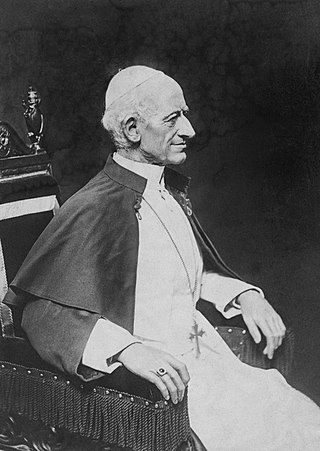
Rerum novarum, or Rights and Duties of Capital and Labor, is an encyclical issued by Pope Leo XIII on 15 May 1891. It is an open letter, passed to all Catholic patriarchs, primates, archbishops and bishops, that addressed the condition of the working classes.
An encyclical was originally a circular letter sent to all the churches of a particular area in the ancient Roman Church. At that time, the word could be used for a letter sent out by any bishop. The word comes from the Late Latin encyclios. The term is now primarily associated with papal encyclicals.
Catholic social teaching (CST) is an area of Catholic doctrine which is concerned with human dignity and the common good in society. It addresses oppression, the role of the state, subsidiarity, social organization, social justice, and wealth distribution. CST's foundations are considered to have been laid by Pope Leo XIII's 1891 encyclical, Rerum novarum, which advocated distributism. Its roots can be traced to Catholic theologians such as Thomas Aquinas and Augustine of Hippo. CST is also derived from the Bible and cultures of the ancient Near East.

Humanum genus is a papal encyclical promulgated on 20 April 1884 by Pope Leo XIII.
Qui pluribus is an encyclical promulgated by Pope Pius IX on 9 November 1846. It was the first encyclical of his reign and written to urge the prelates to be on guard against the dangers posed by rationalism, pantheism, socialism, communism and other popular philosophies. It was a commentary on the widespread civil unrest spreading across Italy, as nationalists with a variety of beliefs and methods sought the unification of Italy.
Etsi Nos was a papal encyclical promulgated by Pope Leo XIII in 1882 denouncing the way in which post-unification Italy denigrated the role of the Church, which it blamed primarily on Freemasonry:
"It is even reported that this year it is about to receive the deputies and leaders of the sect which is most embittered against Catholicism, who have appointed this city as the place for their solemn meeting. The reasons which have determined their choice of such a meeting place are no secret; they desire by this outrageous provocation to glut the hatred which they nourish against the Church, and to bring their incendiary torches within reach of the Roman Pontificate by attacking it in its very seat."
Praeclara gratulationis publicae is an apostolic letter of Pope Leo XIII promulgated on 20 June 1894.
Officio sanctissimo, subtitled "On The Church in Bavaria", was a papal encyclical published by Pope Leo XIII in 1887. It recalled the continuous history of Catholicism in Bavaria; and praised the people's resistance to the Kulturkampf. It also condemned Freemasonry, calling it a "sect of darkness."
Custodi di quella fede was a papal encyclical promulgated by Leo XIII in 1892 addressed to the Italian people.
Inimica vis is a papal encyclical addressed to the Catholic bishops of Italy. It remarked on the multiple condemnations of Freemasonry over the preceding century and a half and concentrated on the local difficulties of the Italian church. It was promulgated by Leo XIII in 1892.
There are many papal pronouncements against Freemasonry; the most prominent include:
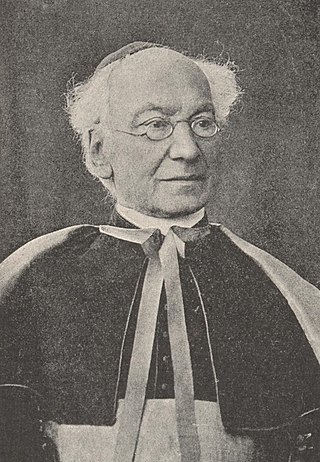
Giuseppe Pecci was a Jesuit Thomist theologian and the older brother of Pope Leo XIII, whose younger brother, Vincenzo, became the Pope Leo XIII and appointed him a cardinal. The Neo-Thomist revival, which Pecci and Leo XIII originated in 1879, remained the leading papal philosophy until Vatican II. He was the last papal relative elevated to cardinal.

The Monument to Giordano Bruno, created by Ettore Ferrari, was erected in 1889 at Campo de' Fiori square in Rome, Italy, to commemorate the italian philosopher Giordano Bruno, who was burned there in 1600. Since its inception the idea of a monument dedicated to the executed heretic located in Rome, once the capital of the Papal States, has generated controversy between anti-clerical and those more aligned with the Roman Catholic church.
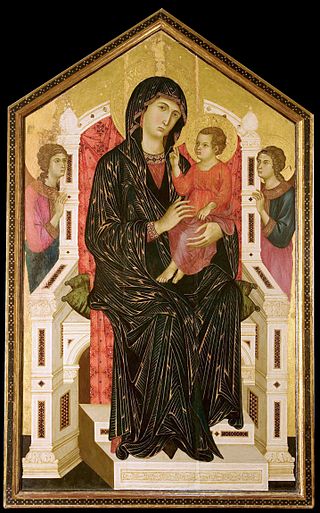
Mariological papal documents have been a major force that has shaped Roman Catholic Mariology over the centuries. Mariology is developed by theologians on the basis not only of Scripture and Tradition but also of the sensus fidei of the faithful as a whole, "from the bishops to the last of the faithful", and papal documents have recorded those developments, defining Marian dogmas, spreading doctrines and encouraging devotions within the Catholic Church.
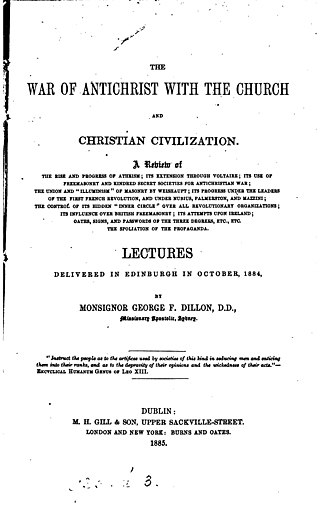
The War of Anti-Christ with the Church and Christian Civilization is a book written in 1885 by an Irishman, Msgr George F. Dillon, DD. It was republished in a slightly edited form by Fr Denis Fahey in 1950 as Grand Orient Freemasonry Unmasked as the Secret Power Behind Communism. The central theme of the book alleges that atheistic Illuminism, through the infrastructure of Grand Orient freemasonry, driven by the ideology of the philosophes laid the foundations for a large scale, ongoing war against Christendom in general and the Catholic Church in particular. The document claims that it had been manifested primarily through manipulating the outbreak of various radical liberal republican revolutions, particularly those focused on atheism or religious indifferentism in their anti-Catholicism. The book details revolutionary activity in France, Italy, Germany and Ireland.
The question of whether Freemasonry is anticlerical is the subject of debate. The Catholic Church has long been an outspoken critic of Freemasonry, and some scholars have often accused the fraternity of anticlericalism. The Catholic Church forbids its members to join any Masonic society under pain of interdiction. Freemasons usually take a diametrically opposite view, stating that there is nothing in Freemasonry that is in any way contrary to Catholicism or any other religious faith.







